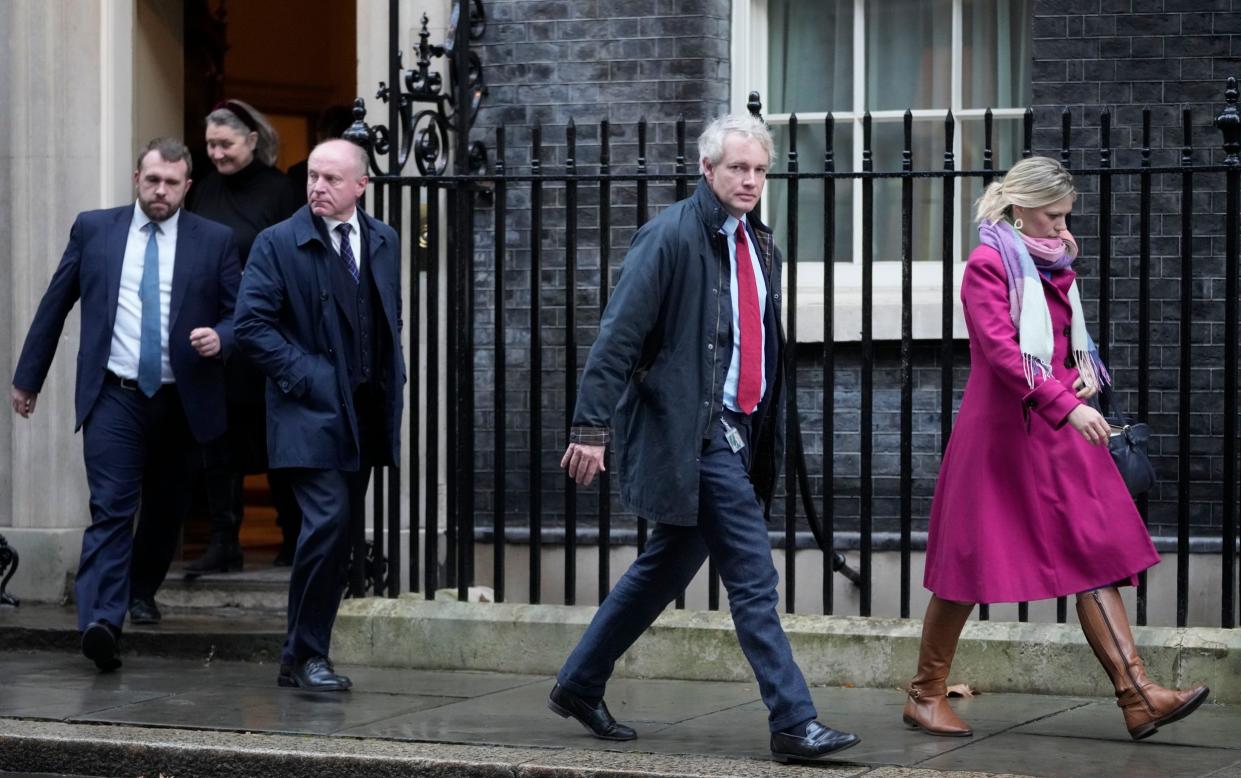Letters: The Rwanda plan survives – but can it really change the Tories’ legacy?

- Oops!Something went wrong.Please try again later.
- Oops!Something went wrong.Please try again later.
SIR – I am sure most people are baffled by the amount of time our politicians have spent debating a flawed policy (“Rishi Sunak wins Rwanda Bill vote despite Tory rebellion fears”, telegraph.co.uk, December 12).
Does the Prime Minister really believe that the risk alone of deportation to Rwanda will deter a migrant willing to put their life in danger crossing the Channel in a flimsy boat?
Sadly, Mr Sunak is following a false trail and, on leaving office, will be seen in the same light as his immediate predecessors.
Peter Robinson
Guildford, Surrey
SIR – The Tory rifts over the Government’s Rwanda plan, along with the immigration crisis and the self-serving leadership positioning among MPs, will hand the next general election to Sir Keir Starmer.
A massive Labour majority is certain unless cohesion and common sense prevail. I am not holding out much hope for that.
Dr Robert J Leeming
Coventry, Warwickshire
SIR – It is unfair to blame Rishi Sunak for high levels of immigration.
What have the Conservatives been doing for the past 13 years to get a grip on legal immigration? Though the boat traffic is an important issue, this one is even more so.
Wesley Hallam
Batheaston, Somerset
SIR – Like A J C Gorman (Letters, December 12), I have voted Conservative for more than 50 years and now find myself in a quandary as to what to do at the next election.
I have never voted Labour and have no intention of doing so now. There are still people in that party who thought Jeremy Corbyn was a good idea – including the current leader. The Conservative Party has to all intents and purposes disappeared, and, as someone who is by instinct conservative, I am effectively left with nobody to support. In the meantime, those who have stayed with the party bicker among themselves.
I hope somebody in the governing classes realises how strong feelings are in the real world.
Michael Morris
Haverhill, Suffolk
SIR – A “dream ticket” partnership between Nigel Farage and Boris Johnson (report, December 12) will not help the Tories in the long term.
The party is too broad a church; eventually Mr Farage and Mr Johnson would be worn down by the men in grey suits and the Tory Left wing. Rather, they should encourage those on the centre-Right to either start a new party or join Reform UK.
They would be unlikely to win the next election, but could well be in a position of influence come the following one.
John Edmondson
Ferndown, Dorset
Not quite the GP
SIR – David Bennett (Letters, December 12) notes the rise of the “physician associate”. In Worcestershire the shift started around 2007, when the out-of-hours GP service was replaced by a commercial entity, the TCN.
All sorts of people were brought in to see patients instead of GPs, and they were known as “clinicians”. The patients rarely twigged they weren’t seeing a doctor, and indeed the commissioners themselves seemed to be taken in too, as often as not.
Dr John O’Driscoll
Worcester
SIR – If this plan for physician associates goes ahead, I suggest that one of the fundamental requirements is that they must wear large, clear name labels stating their role and saying that they are not doctors. Otherwise this is a recipe for monumental mistakes.
Surely the public have a right to know who is providing their care and what their qualifications are. I hope that the concerns of the Doctors’ Association UK are listened to.
Dr Linda Dickson
Cambridge
SIR – Whenever I am summoned to the surgery to monitor a chronic condition, I am no longer seen by a doctor but instead by a “healthcare professional”. This is fine, but it does make me wonder who would want to be seen by a healthcare amateur.
Richard Light
Hitchin, Hertfordshire
Second home penalty
SIR – I own a second home in Devon that is used by family and friends for at least 12 weeks of the year. They boost the local economy by using the many cafés, pubs, restaurants, shops and other services and facilities.
Why should I pay double council tax (Letters, December 12) when I do not even have a vote in that area?
Annie White
Salisbury, Wiltshire
A Bitcoin economy
SIR – In his report on Argentina (Business, December 11), Roger Bootle cites El Salvador as an example of a country that has made the conversion from a failing national currency to the US dollar. In fact, Argentina’s shadow economy has for many years used the US dollar alongside the peso. Argentina’s president, Javier Milei, is merely planning to get rid of the peso and the central bank that has been printing it into oblivion.
Two years ago, President Nayib Bukele of El Salvador introduced a new hard currency, Bitcoin, to run alongside the US dollar and the Salvadorian peso. Now, many Salvadorians prefer Bitcoin because, unlike the other two currencies, it holds its value and can never be inflated. A flood of inward investment has succeeded in stimulating the economy and El Salvador has managed to pay off its dollar-denominated debt.
Argentina’s new president, like the president of El Salvador, is a student of the Austrian school of economics – and a Bitcoin enthusiast.
C M McNulty
Oxhey, Hertfordshire
Going to pot
SIR – I must correct Dr J P Dickinson’s letter (December 11) praising the durability of speed humps.
A rat-run of a lane near me has had several speed humps added. They are poorly constructed and have deteriorated so badly that they have now developed their own potholes.
Graham Bond
Matching Green, Essex
Dying with dignity
SIR – I fully endorse the comments of your correspondents regarding assisted death (Letters, December 11).
At the age of 82 I have been diagnosed with motor neurone disease. The thought of the suffering I am about to endure and the effect it will have on my family horrifies me. This fear would be greatly reduced if I could choose a dignified ending to my life.
Peter Connor
Perton, Staffordshire
SIR – Andy Bebbington (Letters, December 8) lists “mental incapacity” as one of the conditions that should enable someone to end their life.
But how can someone without mental capacity give their consent to being helped to die?
Andrew Nash
Abingdon, Oxfordshire
A sobering fact
SIR – Your feature (December 11) explains how much alcohol affects driving ability.
I went to the optician one afternoon following a pub lunch with a small glass of red wine. When taking the field of vision test I registered very few of the spots of light, and was told to return to take the test again the following day. The second time around, my response was perfect.
I realised that with only a small amount of alcohol my peripheral vision was seriously impaired. I have never had a drink before driving since that experience; it’s not worth the risk.
Jenny Scruton
Hull, East Yorkshire
Beards and masks
SIR – We in the nuclear industry also had problems with fitting respirators (Letters, December 11) to those with facial hair or chronic skin issues.
Battery-powered air hoods provided an excellent replacement, and it transpired that they had better filtration properties than full-face negative pressure respirators.
Barry Sheldon
Cholsey, Oxfordshire
Ready to Womble
SIR – I am pleased that the Wombles are returning (report, December 12), “making good use of the things that we find, things that the everyday folk leave behind”. They were ahead of their time. In our house, taking the rubbish out to our recycling bins is still known as “doing the wombling”.
Trina Golland
Hatfield, Hertfordshire
Pyjamas with pockets: the professional’s choice

SIR – The reason Marks & Spencer pyjamas now have pockets (Letters, December 12) is that the work-from-homers are taking their children to school in them and need somewhere to stow their mobile phones.
Philip Barber
Havant, Hampshire
SIR – The pyjama pocket is for your vape when you get on the bus.
Lynda Cox
Southampton
SIR – Pyjama pockets are perfect for carrying late-night treats – crackers especially – and have long been used for that purpose in our household.
Mary Riley
Doncaster, South Yorkshire
SIR – Never mind the pockets. Why sell two pairs of trousers without the tops?
Peter Gates
Eastbourne, East Sussex
A welcome move for opera lovers in the North
SIR – Here in the wild north-west of Yorkshire, we are 200 miles from London, to where a rail ticket at suitable times can cost more than £300.
Therefore, unlike Geraldine Wills in Somerset (Letters, December 12), we are unable to enjoy any performances by English National Opera without huge expense, plus the cost of an overnight stay.
Manchester – its future home – is only 40 miles away, and an hour by car or 90 minutes by bus and train. Its transfer there is as welcome to millions like us as its movement from London is deplorable to those who have enjoyed easy access for so long.
David Pearson
Haworth, West Yorkshire
SIR – It makes no sense for ENO to move to Manchester, where it will compete with Opera North to entertain a population much smaller than that of London and the Home Counties.
It would make more sense for ENO and Opera North to merge. Better to have one thriving opera company than two struggling to make ends meet.
Dr Tim Cantor
Tunbridge Wells, Kent
SIR – ENO is to move to Manchester. However, the world-renowned chorus and orchestra – which campaigned so vigorously for the continuation of Arts Council England funding and are the backbone of the company – have been sold down the river by their management and board. Several face redundancy along with other production staff.
What will ENO Manchester be? With fewer world-class musicians, no planned base from which to operate and no clear artistic plan for the future, it seems it will be ENO in name only.
Bo Wang
London W1
Letters to the Editor
We accept letters by email and post. Please include name, address, work and home telephone numbers.
ADDRESS: 111 Buckingham Palace Road, London, SW1W 0DT
EMAIL: dtletters@telegraph.co.uk
FOLLOW: Telegraph Letters on Twitter @LettersDesk
NEWSLETTER: sign up to receive Letters to the Editor here

